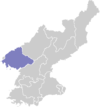Kwaksan County
Kwaksan County is a kun (Korean: 군, 郡, 'county') in coastal southern North P'yŏngan province, North Korea. It faces the Yellow Sea to the south. By land, it is bordered by Kusŏng city in the north, Chŏngju in the east, and Sŏnch'ŏn in the west.
Kwaksan County 곽산군 | |
|---|---|
| Korean transcription(s) | |
| • Chosŏn'gŭl | 곽산군 |
| • Hancha | 郭山郡 |
| • McCune-Reischauer | Kwaksan-gun |
| • Revised Romanization | Gwaksan-gun |
| Country | North Korea |
| Province | North P'yŏngan |
| Administrative divisions | 1 ŭp, 19 ri |
| Area | |
| • Total | 374.5 km2 (144.6 sq mi) |
Geography
Numerous small rivers meet the sea in Kwaksan, including the Tongrae, Sasŏng, and Sach'ŏn (사천강). There are 15 islands off the coast, which measures 67 kilometres (42 mi) in total. Forestland occupies 46.5% of the county's area, and is 80% pine; cultivated land occupies 30% of the area, and is 50% rice paddies.
Administrative divisions
Kwaksan county is divided into 1 ŭp (town) and 19 ri (villages):
|
|
Climate
The year-round average temperature is 9.2 °C (48.6 °F), with a January mean of −8.2 °C (17.2 °F) and an August average of 23.7 °C (74.7 °F). The average annual rainfall is 1,380 millimetres (54 in).
Economy
The chief crops are rice, maize, apples, and peaches. Silkworms and livestock are also raised, and fishing also contributes to the local economy.
Transportation
The P'yŏngŭi Line of the Korean State Railway passes through the county on its way between P'yŏngyang and Sinŭiju.
Places of interest
Local attractions include a five-story stone pagoda dating from the Koryŏ period in Wŏnha-ri, and the Rŭngsan fortress (릉산성), established in 996 by the general Sŏ Hŭi.
The only institution of higher learning in the county is a technical school.
See also
References
- International Information Research Institute (국제정보연구소) (1999). "곽산군". 北韓情報總覽 2000 [Bukhan jeongbo chong-ram 2000]. Seoul: Author. pp. 841–842.
External links
- (in Korean) In Korean language online encyclopedias:
